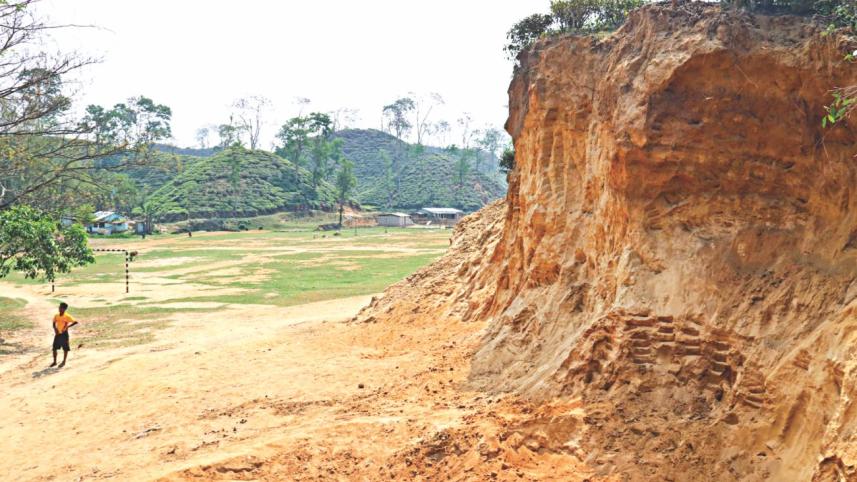Malnichhara Tea Garden to pay for razing hillocks

The Department of Environment (DoE) has finally cracked down on the Malnichhara Tea Garden for cutting hillocks in its estate for tea plantation.
Md Mujahidur Rahman, assistant director of the Enforcement and Monitoring Wing of the DoE, fined the tea estate Tk 9.2 lakh on Tuesday based on a report by the Sylhet office of DoE.
The Bangladesh Environment Conservation Act, 1995 (amended 2010) strictly prohibits the cutting or razing of government-owned hillocks by any individual or institution. Exceptions may be made, but only after a clearance certificate is issued by the DoE.
On March 10, environmentalist Abdul Karim Kim, general secretary of Bangladesh Poribesh Andolon (Bapa) in Sylhet, and Anis Mahmud, photojournalist at the Daily Prothom Alo, saw the cutting of three hillocks at the Malnichhara Tea Garden, the oldest commercial tea garden in Sylhet.
However, garden officials confronted them and confiscated their cameras at that time. Later, they sought the help of the police and were able to exit.
Prompted by this incident, a team of DoE in Sylhet inspected the garden on March 12 and found that three hillocks were being ravaged by the garden authorities.
Regarding the fine, Abdul Karim Kim said the amount is not enough for the scale of environmental damage caused, but added it will be an example for other tea gardens in the district.
He also opined that legal action, such as cancellation of lease, would have been a more effective punishment.
Representatives of the Malnichhara Tea Garden could not be reached for comment.

The hills in northeast Bangladesh that are used to grow tea plants are all government-owned land and are leased to individuals or institutions for commercial tea production.
Azam Ali, assistant manager of the garden, had told The Daily Star in March that the hillock was not being used in tea production, and that they needed the soil to repair some internal garden roads.
However, this correspondent visited the site on May 2 and found that tea plantation was being done on the hillocks, to cover up the razed parts.
The 1,500-acre Malnichhara Tea Garden came into commercial tea production in 1854. After the Liberation War in 1971, industrialist Ragib Ali took a part of the garden on lease and is still the owner of the estate.
He and his son Abdul Hye were later convicted in two cases of land grabbing of Tarapur Tea Estate and forging legal documents, and sentenced to 14 years in jail. They are currently out on bail.




 For all latest news, follow The Daily Star's Google News channel.
For all latest news, follow The Daily Star's Google News channel.
Comments